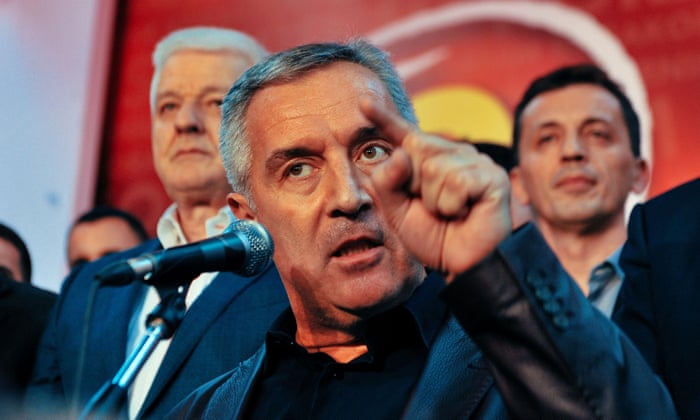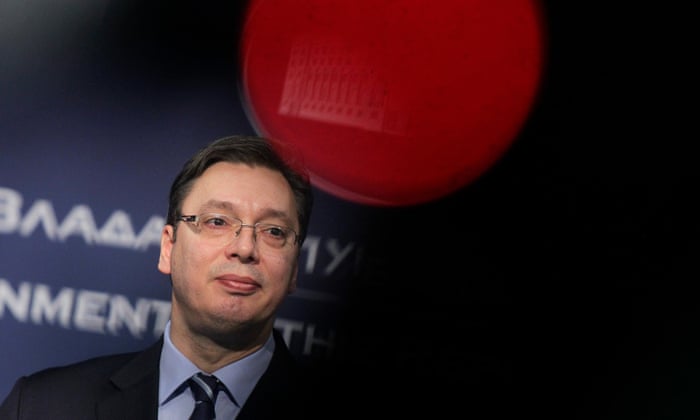Serbia deports Russians suspected of plotting Montenegro coup]
Plotters were allegedly going to storm Podgorica parliament, shoot Milo Ðjukanović and install a pro-Moscow party
 The Montenegrin prime minister, Milo Đjukanović. Photograph: Savo Prelevic/AFP/Getty Images
The Montenegrin prime minister, Milo Đjukanović. Photograph: Savo Prelevic/AFP/Getty Images
Julian Borger in Washington, Andrew MacDowall in Belgrade and Shaun Walkerin Moscow-Friday 11 November 2016
 Serbia has deported a group of Russians suspected of involvement in a coup plot in neighbouring Montenegro, the Guardian has learned, in the latest twist in a murky sequence of events that apparently threatened the lives of two European prime ministers.
Serbia has deported a group of Russians suspected of involvement in a coup plot in neighbouring Montenegro, the Guardian has learned, in the latest twist in a murky sequence of events that apparently threatened the lives of two European prime ministers.
The plotters were allegedly going to dress in police uniforms to storm the Montenegrin parliament in Podgorica, shoot the prime minister, Milo Ðjukanović, and install a pro-Moscow party.
The Russian fingerprints on the October plot have heightened intrigue about Moscow’s ambitions in a part of Europe hitherto thought to be gravitating towards the EU’s orbit.
A group of 20 Serbians and Montenegrins, some of whom had fought with Moscow-backed separatists in eastern Ukraine, were arrested in Podgorica, the Montenegrin capital. In Serbia, meanwhile, several Russian nationals suspected of coordinating the plot were caught with €120,000 and special forces uniforms.
According to the Belgrade daily, Danas, the Russians also had encryption equipment and were able to keep track of Đjukanović’s whereabouts.
Diplomatic sources told the Guardian the Belgrade government quietly deported the Russians after the intervention of the head of the Russian security council, Nikolai Patrushev, who flew to Belgrade on 26 October in an apparent effort to contain the scandal. The country’s interior minister, Nebojša Stefanović denied the government carried out any deportations connected to the plot.
A source close to the Belgrade government said Patrushev, a former FSB (federal security service) chief, apologised for what he characterised as a rogue operation that did not have the Kremlin’s sanction. In Moscow, a Security Council official told Tass that Patrushev “didn’t apologise to anyone, because there is nothing to apologise for”.
The Serbian government was further rattled three days after Patrushev’s visit when a cache of arms was found near the home of the prime minister, Aleksandar Vučić. The weapons were discovered at a junction where Vučić’s car would normally slow down on his way to the house.
Stefanović said there were “strong suspicions” that an organised crime gang had been hired to kill Vučić for €10m, but he would not specify who was behind the alleged plot, saying further investigation would show whether people “outside the region” were involved.

Aleksandar Vučić addresses the media in Belgrade, in October. Photograph: Andrej Cukic/EPA
“You know the people who don’t like a strong Vučić or a strong government of Serbia and who could contribute some money, €10m or so, to see this kind of thing done,” Stefanović told the Guardian.
“We know that the people who were potentially hired to do this kind of thing were from the region, but not from Serbia, and that there were crime groups that are operating in the region that were involved. But these were just the trigger persons,” the minister added.
“We believe that criminal gangs are just being used to do the job, but the motives are not linked to the gangs. The assassination of the prime minister is not something that even they would do lightly, we believe they are being used.”
Since the discovery of the weapons, Vučić has announced plans to shake up the intelligence service, saying the security situation was “even more serious than we expected”.
“There will be changes in the secret service,” he told the public broadcaster, RTS. “I believed in the skills of people who didn’t show that they have these capacities, but I’ll take responsibility for this.”
It is unclear whether there is a connection between the alleged assassination plots against Vučić and Đjukanović. But the intrigue of the past month comes against a backdrop of fierce east-west competition.
Đjukanović has been instrumental in pulling his country to the verge of Nato membership – an accession protocol was signed in May – which has dashed Russian hopes of securing a naval foothold on the Adriatic. According to the Montenegrin press, Moscow lobbied hard in recent years for transit and maintenance facilities at the ports of Bar and Kotor.
The importance of such facilities was demonstrated late last month when the Russian carrier, the Admiral Kuznetsov and its battle group was denied refuellingin European ports along their way to support the Russian military effort in Syria.
In Serbia, Vučić has been seeking a delicate balance between Nato and Russia, and the country’s armed forces have conducted military exercises with both, although far more frequently in recent years with Nato. Vučić has also refused to grant diplomatic status to Russian officials staffing a Serbian-Russian humanitarian centre established in the city of Niš in 2012, infuriating Moscow.
Western officials suspect the centre of being a Trojan horse, which could expanded as a hub for intelligence and paramilitary operations in the region. Diplomatic status, they point out, would have allowed equipment to be brought in without oversight by Serbian customs.
Some analysts have suggested the operation could have been mounted as a “semi-freelance” one, giving enough distance from Moscow to be plausibly deniable if was uncovered.
“Both sides have an interest in playing this as a freelance, vigilante-type thing, it allows them both to save face. Whether that’s actually true is unclear. There’s simply not enough evidence either to support or disprove it,” said Vladimir Frolov, a Moscow-based analyst.
“Judging from the amount of logistical and financial support they got, it looks likely they acted with at least a tacit understanding that this was sanctioned.”
A few days after the would-be coup, a former intelligence officer, Leonid Reshetnikov, who ran a hawkish research institute in Moscow, was relieved of his duties by Putin. The Russian Institute for Strategic Studies has a branch office in Belgrade, and Reshetnikov had given strong backing to the anti-Nato opposition party in Montenegro.
A security analyst from the region, who did not want to be named, said his understanding from intelligence sources was that the incidents in the Balkans were probably linked to Russian attempts to gain influence and leverage in the Balkans in the run-up to an anticipated Hillary Clinton US presidency, which was expected to take a harder line on Russian activity in the region.
In Moscow, the Russian foreign ministry took a dim view of this Guardian report on the Balkan events.
Maria Zakharova, spokeswoman for the Russian foreign ministry wrote on Facebook: “The publication in the Guardian with a link to ‘sources’ saying that Patrushev apologised for ‘Russian nationalists’ who had planned to kill the prime minister of Montenegro is a classic provocation aimed at spreading knowingly false information.”
“I declare you “liars of the day”. You can sew your own hat.”
